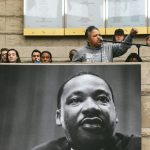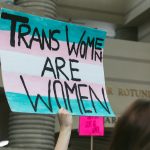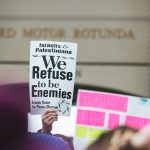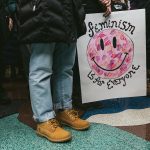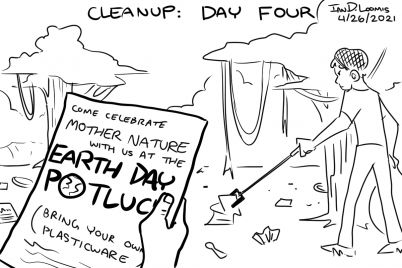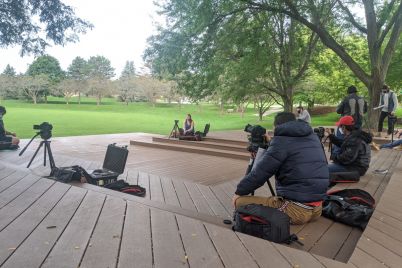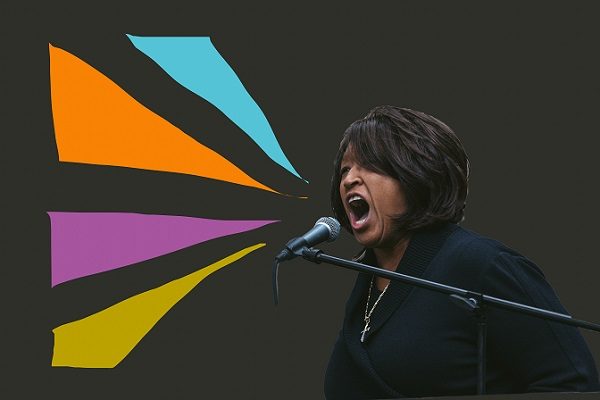
Michigan State Representative Sherry Gay-Dagnogo spoke passionately at the rally. Photo Illustration by Sara Faraj | Washtenaw Voice
By Lilly Kujawski
Editor
The Women’s March, which first took place in 2017 when thousands of women joined together in Washington, D.C. and in cities across the country to protest Donald Trump’s presidency, has been under fire, especially in the past year.
Minister Farrakhan, leader of the Nation of Islam, delivered an anti-semitic speech in 2018 riddled with hateful language, which drew controversy to the movement when it was discovered that Tamika Mallory, co-chair of the Women’s March, was seated in the audience.
Mallory’s association with Farrakhan, coupled with hesitation from herself as well as other Women’s March leaders, to fully denounce him left a year-long bad taste in the mouths of many, to say the least.
However, let’s not forget that historically, women of color have been long excluded from mainstream feminist movements, and that well before the Farrakhan debacle, many women were already expressing those feelings of exclusion from within the movement, claiming it only had the interests of cisgender white women in mind. And rightfully so. A sea of bright pink pussy hats worn by white feminists doesn’t exactly invite a safe space for transgender women and women of color.
So why weren’t we listening then?
It seemed ultimately Mallory’s involvement with Farrakhan that prompted the great divide within the movement. Sister marches separated themselves from the main movement. Others gave up entirely. By 2019, many of the marches that were once set to take place this January around the country had been canceled.
At its core, a women’s movement that doesn’t foster intersectionality on every level isn’t really for women at all. Feminism should not only include, but center the voices of women of color, transgender women and other marginalized groups in a way that is genuine and empowered, not tokenizing. There should be space for every oppressed group and their liberation in the revolution, or else it isn’t a revolution. A movement for the liberation of women should create a culture of radical, unapologetic activism that fights injustice of every kind.
And when it doesn’t, what do we do? Do we casually dismiss the faults of our movement and silence those we are harming? Do we quietly remove ourselves from the movement and stay home?
When setting out to dismantle historically oppressive systems like white supremacy and the patriarchy, following the path of least resistance probably won’t get you very far. This is not a cry to incite violence, but rather the opposite; if we never confront the problem and have that hard discussion, if you never open the door to growth and learning/unlearning, then we’ll never get anywhere.
If we quietly give up, then we let injustice win twice—both within and outside of the movement.
And while some did just that—give up—there were also extensions of the movement in cities throughout the United States who just weren’t ready to throw in the towel.
- Monica Lewis Patrick, popularly known as the “Water Warrior”, spoke during the 2019 Women’s March in Detroit about water justice. Sara Faraj | Photo Editor
- Sara Faraj | Photo Editor
- Sara Faraj | Photo Editor
- Sara Faraj | Photo Editor
One of those cities was Detroit. On Jan. 19, the Detroit branch of the Women’s March was held in the Charles H. Wright Museum of African American History.
The rally was primarily comprised of speeches from speakers who represented many different identities—including disabled women, LGBTQ+ identified, immigrants, low-income earners, people of Jewish or Muslim faiths, and women of color.
“There is a war on our land, there is a war on our bodies, there is a war on our hair, there is a war on our freedom,” said Siwatu-Salama Ra, a black mother whose former imprisonment for self defense spurred protest and made national news.
Brooke Solomon of Detroit Area Youth Uniting Michigan reminded the audience that to be real is to be imperfect and encouraged us to hold each other accountable “with love.”
“Being whole means being messy, making mistakes, being whole means being real,” Solomon said.
Danielle Atkinson of Mothering Justice asked the audience to take a moment and reflect on the people who “brought you to this place.”
“This space is not free, it was fought for, it was cried over, it was prayed for,” Atkinson said of the activists who came before us.
Throughout the rally, speakers also acknowledged that we were holding this space on indigenous land.
A central theme in many of the speeches was one of unity and intersection.
“We don’t have the luxury to divide ourselves by these binaries,” said speaker Monica Lewis Patrick, “Water Warrior” activist and co-founder of We The People of Detroit.
Elder Leslie Mathews of Michigan United urged the crowd to continue in dialogue.
“We’ve got some real tough conversations we gotta have this year,” Mathews said.
We are reminded, once again that like it or not, we’re stronger together.
“We must support each other. Without supporting each other, they will never support us,” said Nicole Small, a Detroit activist, sharing similar sentiments to other speakers.
We must support each other, but we must also hold each other accountable and push for growth within ourselves. And we must never allow space for intolerance and exclusion in the fight for justice.

